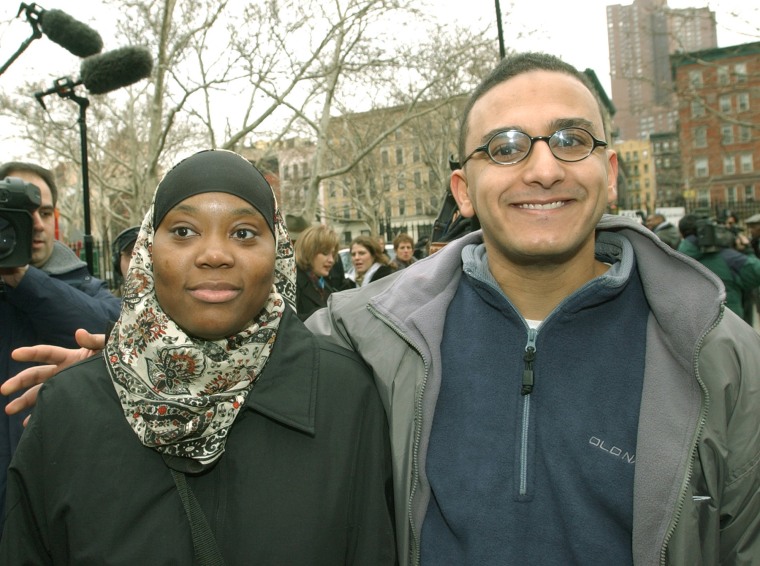They were different men going in different directions — one a visiting Egyptian student on scholarship, the other an ex-cop in a dead-end job as a hotel security guard.
But an aviation radio left in a high-rise hotel brought Abdallah Higazy and Ronald Ferry together in an unfortunate footnote to the Sept. 11 terrorist attacks.
In his zeal to fight terror, Ferry twisted the truth about the radio — capable of contacting commercial pilots from the ground — and triggered an investigation that needlessly landed Higazy in jail for a month.
Five years later, Higazy, 35, is back in Egypt, where he views his case as a parable about the false suspicions endured by innocent young Arab and Muslim men following the attacks.
“Not all the victims of 9/11 were in the twin towers and Pentagon,” he said in a recent interview. “There were other victims, too.”
Attempts by The Associated Press to contact Ferry, 53, were unsuccessful. There was no telephone listing for him, and his former attorney said they were out of touch.
Speaking by phone from Cairo, Higazy recalled being thrilled when he arrived in the United States on Aug. 27, 2001, to begin a graduate program in computers. His college temporarily put him up in a room on the 51st floor at the Millennium Hotel, in the shadow of the World Trade Center.
He was there on the morning of Sept. 11 when the planes struck with a force that shook the hotel. During an evacuation, he managed to grab only his student identification and cash. He later found housing in Brooklyn and began school.
'Extremely important item of evidence'
Enter Ferry.
The Millennium security guard — who had quit the Newark, N.J., police force because of a drug problem — was assigned in October to inventory items left behind by guests, court papers said. He reported to a supervisor that among the belongings found in a safe in Room 5101 were the aviation radio and an Egyptian passport — Higazy’s.
The discovery was troubling to investigators who believed a conspirator could have used the handheld device to coordinate with the hijackers aiming airliners at the twin towers. It was considered “an extremely important item of evidence,” one government filing said.
When Higazy was summoned to the hotel in December to retrieve his belongings, the FBI confronted him with the radio.
“I’m sorry, this isn’t mine,” he told agents.
The FBI brushed aside his denials and arrested him as a material witness. He was sure someone would quickly realize he’d been framed — until he spotted Zacarias Moussaoui inside a jail in lower Manhattan.
The man already known as “20th Hijacker” was lodged in the same maximum-security wing. Being in Moussaoui’s company — and being strip-searched, shackled and insulted by guards — was unnerving to a moderate Muslim who had never even read the Koran.
“That’s when it really sunk in that I was in a very, very serious situation,” he said.
Fear forces false 'confession'
Higazy agreed to a polygraph examination. He stuck to the truth, he said, until an FBI agent made veiled threats against his family in Egypt.
He broke down and responded with wild and contradictory tales: He found the radio in the subway. No, he stole it from the Egyptian military.
Citing his “confession,” federal authorities charged him on Jan. 11, 2002, with making false statements. Three days later, a private pilot who was staying one floor below Higazy at the Millennium on Sept. 11, returned to the hotel looking for his aviation radio.
Ferry recanted his story on Jan. 16, court papers said. The same day, with no explanation, a deputy U.S. marshal removed Higazy’s shackles and told him, “You’re free to go.”
About a year later, Higazy sued the hotel and the FBI agent who coerced his false confession for $20 million. He reached an undisclosed settlement with the hotel; a judge later cleared the agent — a ruling that’s still being appealed.
Now married and teaching computer courses, Higazy still blames Ferry for “fooling the government.” But he also has fond memories of New Yorkers who, after recognizing him from news accounts, greeted him with kind words after he was freed.
“Aren’t you the Egyptian man?” he recalled some saying. “We’re sorry.”
Ferry, who pleaded guilty on Feb. 27, 2002, to lying to the FBI about the radio, served his sentence of weekends in jail for six months, then faded back into obscurity. His motives remain murky as well.
“That was during a time of patriotism,” he said at his sentencing, “and I’m very, very sorry for that mistake.”
